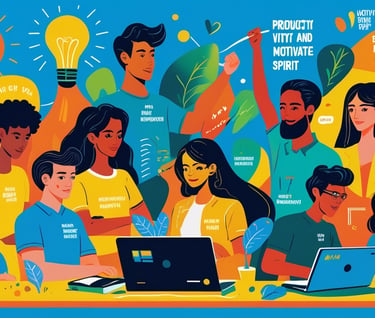Developing Leadership Skills to Scale Up Your Career
SCALE UP


Developing leadership skills is a continuous journey that requires consistent effort.
In a rapidly evolving world, leadership skills are not only essential for those in managerial positions. Every individual who aims to grow and elevate their career to the next level needs to develop leadership abilities. Leadership is not just about directing others; it’s also about leading yourself, motivating your team, and creating a positive impact within an organization.
This article will discuss the key leadership skills needed to successfully lead teams and projects, as well as how to cultivate these skills to be more effective and impactful in your career development.
1. A Clear and Inspiring Vision
The first and most important leadership skill is having a clear vision and the ability to communicate it effectively. A successful leader not only understands long-term goals but can also inspire their team to work together toward that vision.
How to develop this skill:
Clearly define your personal and professional goals. Know the direction you want your career to take and create a plan that supports your vision.
Practice speaking confidently about your goals. Try sharing your vision with others and observe their responses. The more you practice, the better you’ll become at inspiring others.
2. Effective Communication Skills
Leadership cannot exist without effective communication. The ability to speak, listen, and provide constructive feedback is crucial when leading teams and managing projects. Good communication ensures that everyone understands the goals, roles, and expectations, reducing errors and boosting productivity.
How to develop this skill:
Spend more time listening than speaking. Being a good listener helps you understand others’ needs and concerns, allowing you to offer better solutions.
Practice giving clear, timely, and empathetic feedback. Use effective communication techniques, including supportive body language and tone.
3. The Ability to Make Quick and Smart Decisions
Leaders are often faced with decisions that need to be made quickly. The ability to make the right decision under time pressure is a key skill every leader must have.
How to develop this skill:
Train yourself to base decisions on data and available information rather than emotions or pressure.
Expose yourself to situations that require quick thinking, both professionally and personally, to strengthen your decision-making.
Learn to assess risks and evaluate the consequences of your decisions to build confidence in your choices.
4. The Ability to Empower Others
A good leader doesn’t just focus on personal achievements but also strives to empower their team. Empowering others means trusting them, giving them opportunities to grow, and helping them find a deeper sense of purpose.
How to develop this skill:
Identify strengths and potential in your team members, and assign responsibilities aligned with their abilities.
Create an environment that encourages open communication and idea-sharing. Empowering leaders listen and give space for others to thrive.
Provide training and personal development opportunities for your team and support them in reaching their goals.
5. Time and Priority Management Skills
Effective leaders know how to manage time and priorities efficiently. This skill allows you to work productively and ensures that important projects are completed on time without compromising quality.
How to develop this skill:
Use time management techniques such as time blocking or the Pomodoro method to stay productive.
Set priorities based on urgency and impact. Learn to say no to tasks that don’t add value to your bigger goals.
Use project management tools like Trello, Asana, or Notion to track progress and ensure key tasks are completed on schedule.
6. Conflict Resolution and Team Harmony
No team is completely free of conflict. A good leader must be able to handle conflict constructively and maintain harmony within the team. Strong relationships among team members are essential for smooth collaboration.
How to develop this skill:
Learn to manage conflict by listening to all sides and finding win-win solutions.
Practice negotiation and empathetic communication. When you approach conflicts openly, your team will feel more comfortable resolving issues.
Always approach conflict with the goal of improving the situation, not just winning the argument.
7. Assertiveness and Courage to Take Action
An effective leader must be assertive in decision-making. Assertiveness shows that you know what you want and are willing to take responsibility. In addition, the courage to take action in the face of uncertainty is vital in leadership.
How to develop this skill:
Train yourself to make decisions and take action even when the situation is imperfect. Sometimes, a quick and firm response is better than waiting too long.
Take small steps to build courage when facing uncertainty. The more risks you take, the more you’ll grow in confidence when dealing with challenges.
8. Building Strong Relationships and a Wide Network
Leadership also involves the ability to build strong relationships, both within and outside your team. A broad network can open up new opportunities for your career and project development.
How to develop this skill:
Get involved in various activities, both inside and outside of work, to expand your network.
Be a source of support and value for others. When you give, you build stronger, more lasting relationships.
Build relationships based on trust, openness, and honest communication.
Conclusion: Leadership as the Key to Scaling Up Your Career
Developing leadership skills is an ongoing journey that requires consistent effort. With strong leadership abilities, you won’t just lead teams and projects more effectively—you’ll also unlock new growth opportunities in your career.
By improving your communication, decision-making, team empowerment, time and conflict management, you’ll create a bigger impact on every project you undertake. Effective leadership is the key to scaling up your career, and every skill you develop brings you one step closer to achieving your greatest goals.
